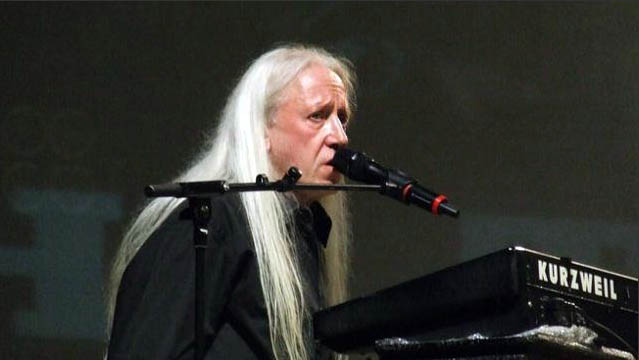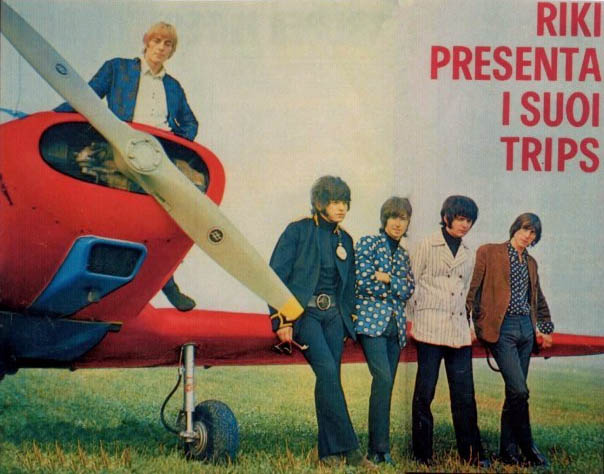|
Joe Vescovi Long Live Rock'n'Roll era Audition  One of many English bands coming to Italy in search of success during the beat-era, The Trip included a young Ritchie Blackmore in their first line-up (late 1966), along with founder members Arvid "Wegg" Andersen (bass, vocals) and Billy Gray (guitar, vocals) and drummer Ian Broad, but a line-up change brought two Italians in, keyboards player Joe Vescovi from Savona (later the leading figure in the band) and drummer Pino Sinnone from Turin. A Trip to Milan  Enrico (Riki) Maiocchi (1940-2004) was one of the most talented singer in Italy in the Sixties; founder and leader of "I Camaleonti" a band formed in Milan in 1965. In the Summer of the following year Riki leaves the band and gone to London in search of musicians for his new own project. He meets Scouser drummer Ian Broad, previously member of various groups - Rory Storm & The Hurricanes, The Seniors and The Bigs, an English combo relocated in Italy during 1965-66. Broad suggested Riki to hire a talented guitarist named Ritchie Blackmore, who at this moment plays with Neil Christian & The Crusaders; and he brings also his bass player in the Crusaders: Arvid "Wegg" Andersen. To complete the new group they needs a rhythm guitarist and their choice was Billy Gray, previously member of Scottish band The Anteeks and, for a short time, in the Buzz with David Bowie. When they came to Italy in September of 1966 someone referred to this experience like "A trip to Milan" so the new name for the band was found. After only few weeks Maiocchi decided to goes solo and the band continued with Ian Broad as drummer and lead singer. In December Ritchie Blackmore quits to come back in London (rejoining Screaming Lord Sutch, of course later he founded the Deep Purple) and the remaining trio - Ian, Billy and Wegg - hired an Italian keyboardist named Joe Vescovi (from Savona) who became the leader of the Trip. When Broad was sacked from the group in Autumn they found a new drummer in Pino Sinnone, from Turin and The Trip continued his history as a progressive band in the Seventies. Audition for Rainbow Arvid "Wegg" Andersen told Blackmore called him about the organist's job he was trying to fill. "He heard Joe on one of our records and seen his photo so he asked me about him. I told Ritchie he was shit hot and arranged for Joe to make a tape with some of the demos we had written and played on together. Joe sent the tape to me and I passed on it to Ritchie". Vescovi was invited for an audition. In an interview with Italian guitarist Matteo Filippini he told about his audition: Ritchie was usually the one who arrived first, then he started to improvise on some riffs, and the band followed him, jamming until Ronnie Dio, who was hardly ever present, started to improvise some melodies on the track. Everything was being recorded with a small Sony, and at the end of the day they listened to it together to get the overall effect. The rehearsals usually started at around 3 PM and lasted until about 10PM. Then we used to go to the Rainbow Bar and Grill, the famous bar patronised by stars where I had the chance to meet personalities like Eric Clapton and Rod Stewart. Although Blackmore initially seemed positive about Vescovi, the Italian recalls that the guitarist's outlook changed overnight. Blackmore informed Vescovi that he wasn't totally convinced about his way of playing, that his musical style was too different, and that he found him too neoclassical and progressive. "Ritchie was knocked out but Joe blew it", is how Andersen saw it. Rolling Stone Italia Interview You joined The Trip to replace Blackmore. Did you meet him? Yes, of course. In fact, I was supposed to join Rainbow. I met Blackmore when he was still in Deep Purple because in '72 they came to Rome to make a new album (they had this habit of moving every time they had to make an album), then they didn't make the LP and actually argued. At that time I was recording in RCA and there was Wegg Andersen who knew that they had rented a villa for a month and had transformed it into a recording studio with a room for each. And they had already rented the Rolling Stones' mobile studio: science fiction stuff, you understand? That was my first impact with Blackmore. And did you play together? No, not that time, also because they didn't let anyone in. There were plenty of journalists but there were roadies who threw everyone out. Andersen was clearly a friend, because they had played together for many years already in Germany, in Hamburg, and so we spent a few days with them. Deep Purple never did anything with the work of that time because there were already disagreements, so they left for the famous tour in Japan and, since they had to make an album anyway, they came out with Made in Japan just because they had no ideas... In '77, Blackmore was already preparing the third Rainbow album - Long Live Rock'n'Roll - and was looking for a keyboard player. At the time I was in Parma, Wegg was in London and Deep Purple had broken up. He called me to see if I was interested, so I sent him a tape and went to Los Angeles for about a month without finishing anything because he, as usual, didn't have clear ideas. In fact, from the previous lineup to Long Live Rock'n'Roll there was no one left except the drummer and the singer. Obviously we met again in '84 when Deep Purple reformed and in Milan in '87 because the relationship remained good: he liked my way of playing even if for him I wasn't hard enough... and it was exactly that that made me become harder except that then I wasn't with a rock band but with Dik Dik... Joe Vescovi died on November 28, 2014 |